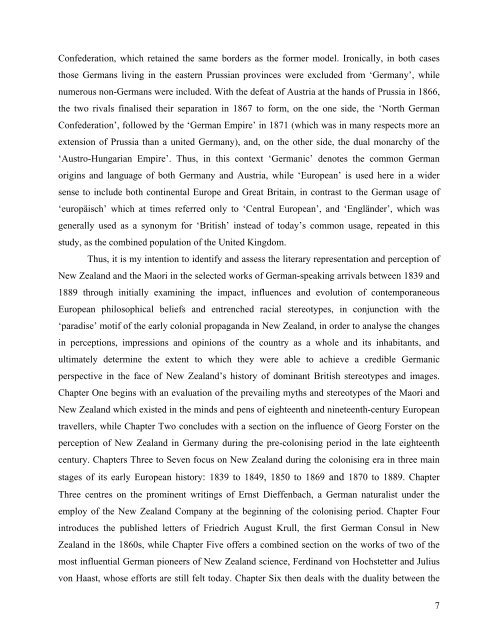Copyright Statement General copyright and disclaimer
Copyright Statement General copyright and disclaimer
Copyright Statement General copyright and disclaimer
You also want an ePaper? Increase the reach of your titles
YUMPU automatically turns print PDFs into web optimized ePapers that Google loves.
Confederation, which retained the same borders as the former model. Ironically, in both cases<br />
those Germans living in the eastern Prussian provinces were excluded from ‘Germany’, while<br />
numerous non-Germans were included. With the defeat of Austria at the h<strong>and</strong>s of Prussia in 1866,<br />
the two rivals finalised their separation in 1867 to form, on the one side, the ‘North German<br />
Confederation’, followed by the ‘German Empire’ in 1871 (which was in many respects more an<br />
extension of Prussia than a united Germany), <strong>and</strong>, on the other side, the dual monarchy of the<br />
‘Austro-Hungarian Empire’. Thus, in this context ‘Germanic’ denotes the common German<br />
origins <strong>and</strong> language of both Germany <strong>and</strong> Austria, while ‘European’ is used here in a wider<br />
sense to include both continental Europe <strong>and</strong> Great Britain, in contrast to the German usage of<br />
‘europäisch’ which at times referred only to ‘Central European’, <strong>and</strong> ‘Engländer’, which was<br />
generally used as a synonym for ‘British’ instead of today’s common usage, repeated in this<br />
study, as the combined population of the United Kingdom.<br />
Thus, it is my intention to identify <strong>and</strong> assess the literary representation <strong>and</strong> perception of<br />
New Zeal<strong>and</strong> <strong>and</strong> the Maori in the selected works of German-speaking arrivals between 1839 <strong>and</strong><br />
1889 through initially examining the impact, influences <strong>and</strong> evolution of contemporaneous<br />
European philosophical beliefs <strong>and</strong> entrenched racial stereotypes, in conjunction with the<br />
‘paradise’ motif of the early colonial propag<strong>and</strong>a in New Zeal<strong>and</strong>, in order to analyse the changes<br />
in perceptions, impressions <strong>and</strong> opinions of the country as a whole <strong>and</strong> its inhabitants, <strong>and</strong><br />
ultimately determine the extent to which they were able to achieve a credible Germanic<br />
perspective in the face of New Zeal<strong>and</strong>’s history of dominant British stereotypes <strong>and</strong> images.<br />
Chapter One begins with an evaluation of the prevailing myths <strong>and</strong> stereotypes of the Maori <strong>and</strong><br />
New Zeal<strong>and</strong> which existed in the minds <strong>and</strong> pens of eighteenth <strong>and</strong> nineteenth-century European<br />
travellers, while Chapter Two concludes with a section on the influence of Georg Forster on the<br />
perception of New Zeal<strong>and</strong> in Germany during the pre-colonising period in the late eighteenth<br />
century. Chapters Three to Seven focus on New Zeal<strong>and</strong> during the colonising era in three main<br />
stages of its early European history: 1839 to 1849, 1850 to 1869 <strong>and</strong> 1870 to 1889. Chapter<br />
Three centres on the prominent writings of Ernst Dieffenbach, a German naturalist under the<br />
employ of the New Zeal<strong>and</strong> Company at the beginning of the colonising period. Chapter Four<br />
introduces the published letters of Friedrich August Krull, the first German Consul in New<br />
Zeal<strong>and</strong> in the 1860s, while Chapter Five offers a combined section on the works of two of the<br />
most influential German pioneers of New Zeal<strong>and</strong> science, Ferdin<strong>and</strong> von Hochstetter <strong>and</strong> Julius<br />
von Haast, whose efforts are still felt today. Chapter Six then deals with the duality between the<br />
7














